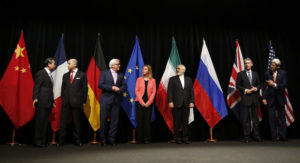December 19, 2016
Farnaz Alimehri
This article originally appeared in Georgetown Security Studies Review on December 12, 2016.
The Joint Comprehensive Plan of Action (JCPOA) between Iran and the P5+1 has been labeled one of the Obama Administration’s culminating achievements in foreign policy and nonproliferation. Despite the successful negotiation and implementation of this agreement by all parties last year, political divisions in the United States and Iran remain strong. Politicians in Washington have been fighting the deal since its inception. The latest attempts to renegotiate the deal claim that it does not do enough to limit Iran’s nuclear program. Former U.S. Senator Joe Lieberman and former ambassador to the United Nations Mark Wallace have stated that, “the Iranian regime has made clear it has no intent to honor the spirit or letter of the JCPOA.” President-elect Donald Trump himself declared he would “tear up the deal” once he arrives in the Oval Office.

Iran nuclear deal: agreement in Vienna. From left to right: Foreign ministers/secretaries of state Wang Yi (China), Laurent Fabius (France), Frank-Walter Steinmeier (Germany), Federica Mogherini (EU), Mohammad Javad Zarif (Iran), Philip Hammond (UK), John Kerry (USA).
Similar messages echo in Tehran, with some Iranian negotiators of the agreement arguing that the United States has not done its part to promote economic recovery for Iranians. They also assert that the United States has refused to honor the “spirit of the deal,” criticizing the decision by the U.S. Senate to expand the Iranian sanctions regime for the next ten years. This sparked a firm response from Iran’s President Hassan Rouhani, who assured there would be retaliation if the new sanctions were to be applied on Iran. With skepticism steeping in both countries, will the deal survive? It’s difficult to ascertain one way or another, but one can analyze the critics’ proposals to determine if there is an alternative pathway moving forward.
Renegotiating the Deal
Many have proposed renegotiation as a possible solution to the “bad” nuclear accord, but this is founded on a presumption that the deal is renegotiable. In reality, the JCPOA is not a bilateral agreement between Iran and the United States. The United Kingdom, France, Germany, Russia, and China are also parties to this agreement, so the United States cannot move unilaterally to renegotiate. Federica Mogherini, the High Representative of the European Union for Foreign Affairs and Security Policy and a principal negotiator of the JCPOA, has made public statements reminding President-elect Trump that, “the Iran deal is a multilateral accord, not a U.S. bargaining chip.”
